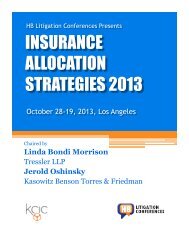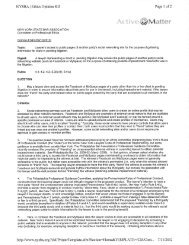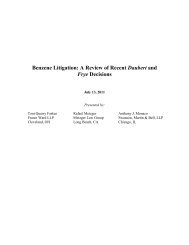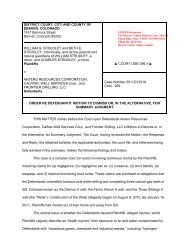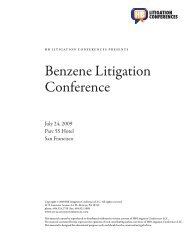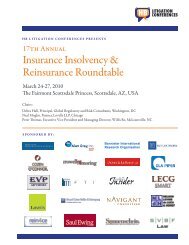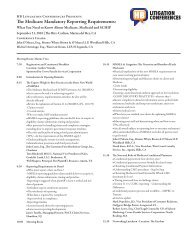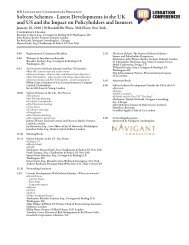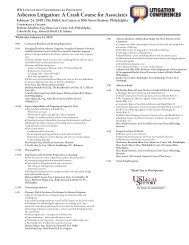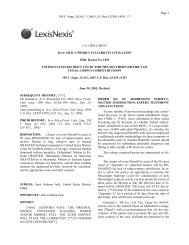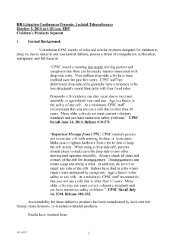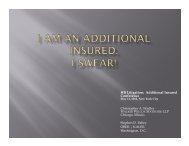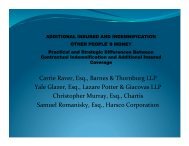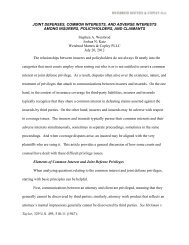- Page 1 and 2:
HB Litigation Conferences Presents
- Page 3 and 4:
FACULTY Jeremy Alters is the foundi
- Page 5 and 6:
works include FasTrain: Florida Civ
- Page 7 and 8:
a Superfund case that resulted in a
- Page 9 and 10:
clerk in the United States District
- Page 11 and 12:
The “Writing On The Wall”: Impo
- Page 13 and 14:
STATES WHERE IMPORTED DRYWALL HAS B
- Page 15 and 16:
Florida Reports of Drywall “Cases
- Page 17 and 18:
STATE RESPOND ● Florida ● Louis
- Page 19 and 20:
Glenn Cambre, Esq. Director Directo
- Page 21 and 22:
PHONE SURVEY INFORMATION: Identifie
- Page 23 and 24:
LOUISIANA DRYWALL IMPACT MAPS 6/17/
- Page 25 and 26:
FLORIDA VS LOUISIANA DRYWALL • Fl
- Page 27 and 28:
Remediation Standard? ● Presently
- Page 29 and 30:
Chairman Pryor, Ranking Member Wick
- Page 31 and 32:
the German manufacturer, Knauf, onl
- Page 33 and 34:
companies, the homeowners, and the
- Page 35 and 36:
Chinese drywall spins off 'silent h
- Page 37 and 38:
The EPA said these results are not
- Page 39 and 40:
Get out of house with Chinese drywa
- Page 41 and 42:
The Consumer Product Safety Commiss
- Page 43 and 44:
“We’re trying to get the federa
- Page 45 and 46:
claims, but it's still a significan
- Page 47 and 48:
Imported Drywall and Health - A Gui
- Page 49 and 50:
Who is at risk? • insomnia • he
- Page 102 and 103:
"The Writing Is on the Wall": Defec
- Page 104 and 105:
significant indemnification or cont
- Page 106 and 107:
The Walls Are Closing In: Chinese D
- Page 108 and 109:
An Introduction to Our Firm Duane M
- Page 110 and 111:
• Utilizing the Construction Grou
- Page 112 and 113:
Occupational Safety and Health Act
- Page 114 and 115:
The Walls Are Closing In: Chinese D
- Page 116 and 117:
"The Writing Is on the Wall": Defec
- Page 118 and 119:
significant indemnification or cont
- Page 120 and 121:
Sheila Raftery Wiggins, Partner Dua
- Page 122 and 123:
Real Estate Litigation • Represen
- Page 124 and 125:
Selected Publications • "The Wall
- Page 126 and 127:
TRIGGER OF COVERAGE cont. 2. “Rel
- Page 128 and 129:
TRIGGER OF COVERAGE cont. 6. Triple
- Page 130:
OTHER CONSIDERATIONS • Deductible
- Page 166 and 167:
*Overused and Overwrought Metaphor?
- Page 168 and 169:
Reduced Sulfur Compounds are Diffic
- Page 170 and 171:
Analysis Methods— Electrochemical
- Page 172 and 173:
Conc. (ppmv) 1.0 0.9 0.8 0.7 0.6 0.
- Page 174 and 175:
Key Reactions* • H2S + H2O + M =
- Page 176 and 177:
Chemistry of Emissions from Drywall
- Page 178 and 179:
What is Damaged? Problems we’re s
- Page 180 and 181:
Copper Wires Blacken Paul G. Philli
- Page 182 and 183:
Pitted Bath Tub Stoppers Paul G. Ph
- Page 184 and 185:
What MAY BE Damaged Problems we’r
- Page 186 and 187:
What’s Reportedly Damaged Other p
- Page 188 and 189:
Black Copper Sulfide TYPICAL BLACKE
- Page 190 and 191:
Reaction Progresses Paul G. Phillip
- Page 192 and 193:
COATED COIL IS ALL BLACK Open Quest
- Page 194 and 195:
PUSH-IN WIRING CONNECTION Open Ques
- Page 196 and 197:
Open Questions • How and where ar
- Page 198 and 199:
Outline Chinese Drywall A Practical
- Page 200 and 201:
Is My Drywall Chinese? b) Visual Ap
- Page 202 and 203:
Is My Drywall Chinese? Is My Drywal
- Page 204 and 205:
Is My Drywall Chinese? • To Test
- Page 206 and 207:
Costs Risk Management 101 • Lesso
- Page 208:
Can This Get Any Worse? • Emergin
- Page 212 and 213:
The Expected Primary Defense: “Po
- Page 214 and 215: Revisions to the “APE APE” Demo
- Page 216 and 217: Cases Interpreting the Pollution Ex
- Page 218 and 219: Other Issues Additional coverage pa
- Page 220 and 221: contradicts the plain language and
- Page 222 and 223: partial off-site exclusion for some
- Page 224 and 225: With respect to the new, absolute p
- Page 226 and 227: Even when courts find that an APE s
- Page 228 and 229: Setting aside expectations of cover
- Page 230 and 231: The LDI’s Advisory Letter warned
- Page 232 and 233: Decisions by the High Courts in Cal
- Page 234 and 235: interpretation comports with the AP
- Page 236 and 237: exclusion should not reflexively be
- Page 238 and 239: The court in Koloms criticized the
- Page 240 and 241: ingestion of lead paint debris foun
- Page 242 and 243: that reject coverage for non-enviro
- Page 244 and 245: Survey of Appellate Court Decisions
- Page 246 and 247: State Limiting Exclusion to “Indu
- Page 248 and 249: State Limiting Exclusion to “Indu
- Page 250 and 251: L:\MASTERLS\Seminar\HB Chinese Dryw
- Page 252 and 253: OCCURRENCE “Property Damage”
- Page 254 and 255: OCCURRENCE Majority View: Liabili
- Page 256 and 257: CHOICE OF LAW Starting point for c
- Page 258 and 259: CHOICE OF LAW “Significant Conta
- Page 260 and 261: Which Contractors Will Be Covered b
- Page 262 and 263: Which Contractors Will Be Covered b
- Page 266 and 267: In sum, in most states the damage c
- Page 268 and 269: the several Chinese drywall claims
- Page 270 and 271: V. The “Absolute Pollution Exclus
- Page 272 and 273: to test for, monitor, clean up, rem
- Page 274 and 275: spraying of pesticide in apartment
- Page 276 and 277: exclusion are not met because the
- Page 278 and 279: VI. Choice of Law As discussed abov
- Page 280 and 281: homes containing Chinese drywall ar
- Page 282 and 283: “legally obligated to pay as dama
- Page 284 and 285: By: Veronica M. Bates TRIGGER OF CO
- Page 286 and 287: TRIGGER OF COVERAGE cont. 4. “Inj
- Page 288 and 289: ALLOCATION 1. Pro Rata • Time on
- Page 290 and 291: Chinese Drywall Litigation NELSON
- Page 292 and 293: NELSON • LEVINE • de LUCA & HOR
- Page 294 and 295: Additional Insured Issues • The m
- Page 296 and 297: Additional Insured Issues • 2004
- Page 298 and 299: Subrogation Opportunities Targets a
- Page 300 and 301: Subrogation Opportunities • Contr
- Page 302 and 303: Subrogation Opportunities • Hurdl
- Page 348 and 349:
Liability Issues Hugh J. Turner Jr.
- Page 350 and 351:
Manufacturers • Knauf Gips, KG (e
- Page 352 and 353:
Suppliers 84 Lumber Co. All Flori
- Page 354 and 355:
Drywall Lawsuit Models • Type 1:
- Page 357:
Express Warranty • Elements - Exp
- Page 360 and 361:
Medical Monitoring • Elements: -
- Page 362 and 363:
Vicarious Liability A corporation
- Page 364 and 365:
What Are The Defenses? Economic Lo
- Page 366 and 367:
DEFENSES Florida - Strict Liabilit
- Page 368 and 369:
DEFENSES Lack of Privity of Contra
- Page 370 and 371:
What Are The Current Issues In The
- Page 372 and 373:
Current Issues • Case Assignments
- Page 374 and 375:
Current Issues Insurance Coverage
- Page 376 and 377:
Issues In Florida • Chapter 558 R
- Page 379 and 380:
Chinese Drywall Conference Sander L
- Page 381 and 382:
Are Chinese Drywall Issues Similar
- Page 383 and 384:
Search for New Defendants • Contr
- Page 385 and 386:
How does Chinese drywall impact hom
- Page 387 and 388:
How does Chinese drywall impact hom
- Page 389 and 390:
Home H Value Over 10 Yeaars How doe
- Page 391 and 392:
Home H Value Over 10 Yeaars Home H
- Page 393 and 394:
Use of Mass Appraisal Models Event
- Page 395 and 396:
Use of Mass Appraisal Models Cross-
- Page 397 and 398:
SUITE 650, FOURTH AVENUE SEATTLE, W
- Page 399 and 400:
concern at the moment remain 2004
- Page 401 and 402:
able, in which case rather than a
- Page 403 and 404:
subject properties and the data use
- Page 405 and 406:
CHINESE DRYWALL LITIGATION UPDATE A
- Page 407 and 408:
5 6
- Page 409 and 410:
WHERE WAS THE CHINESE DRYWALL USED
- Page 411 and 412:
WHAT KIND OF EXPERTS YOU’LL NEED
- Page 413 and 414:
Hydrogen Sulfide Exposure • Belie
- Page 415 and 416:
BACKGROUND PROCEDURE MULTIDISTRICT
- Page 417 and 418:
that there is a much smaller chance
- Page 419 and 420:
applicable standard of liability. D
- Page 421 and 422:
RULES OF PROCEDURE OF THE JUDICIAL
- Page 423 and 424:
- 3 - transferred under Section 140
- Page 425 and 426:
- 5 - (c) Copies of motions for tra
- Page 427 and 428:
- 7 - (c) Once a corporate disclosu
- Page 429 and 430:
- 9 - designating such a pleading a
- Page 431 and 432:
RULE 7.6: TERMINATION AND REMAND In
- Page 433 and 434:
- 13 - (b) Each party filing a moti
- Page 435 and 436:
- 15 - (C) the circuit court of app
- Page 437 and 438:
UNITED STATES JUDICIAL PANEL ON MUL
- Page 439 and 440:
UNITED STATES JUDICIAL PANEL ON MUL
- Page 441 and 442:
UNITED STATES JUDICIAL PANEL ON MUL
- Page 443 and 444:
UNITED STATES JUDICIAL PANEL ON MUL
- Page 447 and 448:
Drywall Common building material ty
- Page 449 and 450:
Chinese Drywall Analysis ( incomple
- Page 451 and 452:
Coal combustion residues Derived f
- Page 453 and 454:
Coal Mine Waste Coal may be sold a
- Page 455 and 456:
Coal Fly Ash Resident complaints E
- Page 457 and 458:
Skin Acne Skin rashes Hives Per
- Page 459 and 460:
Sensitive populations Infants Chi
- Page 461 and 462:
Carbon Disulfide Gas—evaporates
- Page 463 and 464:
Sulfur Dioxide Sulfur Dioxide An E
- Page 465 and 466:
SO 2 Symptoms of Chronic Exposure t
- Page 467 and 468:
Exposure to lower concentrations of
- Page 469 and 470:
GI Symptoms of H 2S Nausea Vomiti
- Page 471 and 472:
Particulate Matter Particulate Matt
- Page 473 and 474:
Airways of Lungs Lungs
- Page 475 and 476:
Clearance from the lungs is not cle
- Page 477 and 478:
Particles containing Heavy metals a
- Page 479 and 480:
Natural Decay Series: Uranium-238 U
- Page 481:
PAHs Benzo[a]pyrene Group 1 Human c



